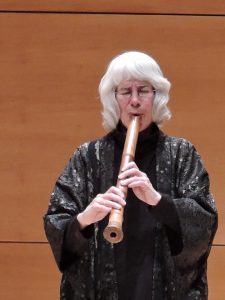JAPANESE GUEST TEACHERS
ZENYŌJI KEISUKE
ZENYŌJI Keisuke started shakuhachi at the early age of 6, with his father, a direct recipient of the art of the great Jin Nyodo. Later he graduate from Tokyo National University of the Arts (Tokyo Geidai) as well as the Master Program at the same university. During his time as a student he studied with GORŌ Yamaguchi (Living National Treasure). In 2000 he published the shakuhachi beginner’s learner manual ‘Hajimete no Shakuhachi [First Encounter with the Shakuhachi]’, Tokyo: Ongaku no Tomosha.
He was awarded the Grand Prize of the Agency for Cultural Affairs National Art Festival for his 2009 recital. Presently he is actively teaching in the Kantō area. His honkyoku was broadcast on the NHK Hogaku radio show, unusual accomplishments for such a young player in conservative Japan.
More information at: www.zenyoji.jp
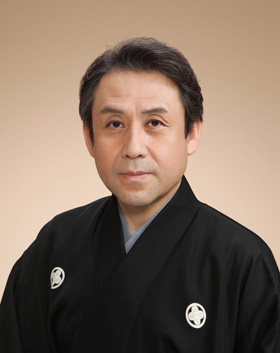
Keisuke ZENYŌJI
KODAMA HIROYUKI
KODAMA Hiroyuki commenced the study of shakuhachi honkyoku with OKUDA Atsuya in 1989. In 1991 he started studying jinashi shakuhachi construction with OKUDA Atsuya and MURAI Chikuei.
Living in the mountains of Nagano Prefecture, he is able to harvest his own bamboo and makes jinashi shakuhachi and teaches shakuhachi honkyoku. In 2009 and 2010 KODAMA gave workshops on jinashi shakuhachi construction and jinashi shakuhachi concerts in Spain with José Seizan VARGAS. He also taught at the European Shakuhachi Summer School in London in 2011.
KODAMA Hiroyuki also recorded the CD ‘Take to Iki’, on which he performs koten honkyoku on long (3.35 and 3.7 length) ji-nashi shakuhachi.
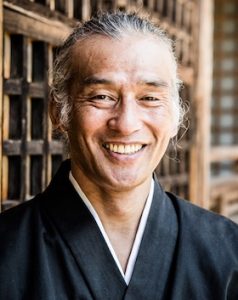
Hiroyuki KODAMA
KURODA REISON
KURODA Reison studied under Living National Treasure AOKI Reibo and AOKI Shouji. He is a graduate of both Waseda University and Tokyo University of the Arts. Passed the NHK Hogaku audition. He won the first prize at the 2nd ‘Tone Hidenori Memorial Japanese Music Competition’ and 1st prize at the Hōgaku Journal International Shakuhachi Competition held during WSF2018 in London. Kuroda has appeared on a number of CDs and as well as NHK television.
In Korea in 2014 he performed Park Beum Hoon’s shakuhachi concerto ‘Flow’ (流) at the Baekjke Cultural Festival. In 2015 he gave the first public performance of YAMAMOTO Kazutomo’s shakuhachi concerto ‘Roaming Liquid’. He also performed TAKEMITSU Toru’s ‘November Steps’ and premiered a number of new shakuhachi pieces including compositions by Claude LEDOUX at the International Contemporary Music Festival ARS MUSICA.
KURODA is a member of the Muromachi Ensemble, which was awarded the 13th Saji Keizo prize, and also of the Hogaku Quartet, whose first CD was specially selected to be in the ‘Noda Teruyuki Japanese Music Collection’ for ‘Record Geijutsu’ (Record Art).
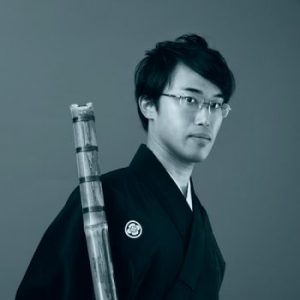
Reison KURODA
EUROPEAN GUEST TEACHERS
ANTONIO ENZAN OLÍAS
The soundtrack of a movie can change the course of a person’s life. That is what happened to Antonio when he watched the film by Baraka, directed by Ron Fricke in 1992. At the beginning of the film, the mysterious sounds of the sublime Japanese bamboo flute appear, masterfully performed by Kohachiro MIYATA. Those first notes were the call to leave everything and start the path of bamboo.
In 2005 he was awarded with two grants, the Gen Foundation and AIE, to deepen his studies of shakuhachi. Antonio Enzan OLÍAS has been instructed under the direction of TANAKA Komei “Kinko Ryu Chikumeisha”, Fuke Shakuhachi with Etsuzan FUJIYOSHI and in contemporary and avant-garde music with TERUHISA Fukuda “Hijiri Kai”, Kuniyoshi SUGAWARA, Shozan TANABE and KATOH Hidekazu. In 2010 Etsuzan FUJIYOSHI awarded him the professional name belonging to his lineage Saiho Enzan • 西方炎山 • and in 2014 TERUHISA Fukuda grants him the Dai Shihan Menjo license “Grand Shakuhachi Master”.
Antonio Enzan OLÍAS has performed concerts and shakuhachi workshops throughout the Spanish geography, Japan and Europe. He has given lectures and concerts at Miguel Hernández University, Music Hall of the University of Alcalá, Universidad Autónoma, Universidad Complutense and Universidad de Granada. Antonio Enzan OLÍAS released his first album in 2007 “Encuentros”, recorded in Japan. He has collaborated on Eduardo PANIAGUA’s album “Cantigas de Nuestro Señor” and, under the direction of Erwin Grafe: “Incrustable Songs”. He was invited to participate at the International Shakuhachi Festival in Prague in 2014.
Prizes: Received the 1st Radio Bratislava Award “New Musics” (2004). Second place at the Intermúsicas Contest (2005). Winner of the Composition Contest 250 Years of the Foundation of Isla Cristina – Huelva (2006). Winner of the World Music Competition of Madrid, in the category of soloist (2007).
He is the forerunner of the Japanese contemporary music duo Ito to Take “Bamboo and Strings” with Erwin GRAFE. He has collaborated with the koto teacher Junko IHARA, performing works by Tadao SAWAI and Hikaru SAWAI. He has recently studied contemporary works composed by Teruhisa Fukuda.
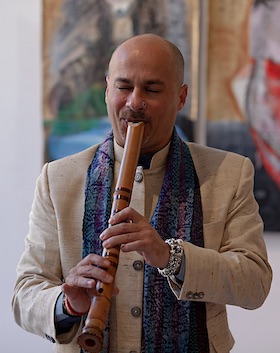
Antonio OLÍAS
DANIEL SEISOKU LIFERMAN
Daniel Seisoku LIFERMANN started learning shakuhachi in 1983.
He studied under guidance of Yoshikazu IWAMOTO, then became a follower of Teruhisa FUKUDA, the founder of Hijiri Kai School. In 1994 Daniel founded the French shakuhachi association LA VOIE DU BAMBOU which is now a branch of the Hijiri Kai School. In 2008 he received from Teruhisa FUKUDA his teacher’s licence Dai Shihan and the name of SEISOKU (Holly Breath) and performs regularly.
Daniel focuses on a spiritual approach of shakuhachi music. He also explores relaxation and meditation with sound.
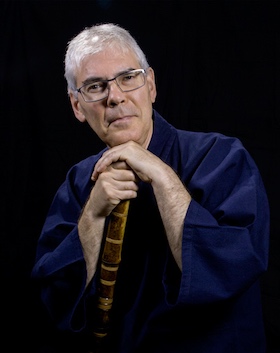
Daniel Seisoku LIFERMANN
ELIZABETH REIAN BENNETT
Elizabeth Reian BENNETT has studied and performed the shàuhachi under Living National Treasure Aoki REIBO, recognized as one of Japan’s foremost instrumentalists, for over thirty years.
Reian BENNETT has performed frequently in Japan and worldwide; appearances in Japan include Tokyo National Theater and NHK, Japanese National Television. Other foreign appearances range from Mexico and Australia to Europe and Afghanistan.
Her last tenure in the United States was at Tufts University north of Boston, in the World Music Program, where she taught and performed the shakuhachi for ten years.
Since her arrival in Morocco in 2017, Reian BENNETT has begun to introduce the shakuhachi to Moroccan audiences and students of music through lecture-demonstrations and concerts. Her most recent concert was under the auspices of the Ministry of Culture and the Conservatoire National de la Musique et de l’Art Chorégraphique in Rabat in April.
See www.elizabethreianbennett.com for more information.
ANNE NORMAN
Anne NORMAN is an Australian-based shakuhachi performer and composer working as a soloist and in collaboration with a diverse range of musicians, visual artists and dancers. She has performed in Australia, Japan, America and Europe. In recent years Anne has been writing eco-poetry, incorporating spoken and sung word into her recitals. In 2018 Anne presented her new music at the World Shakuhachi Festival in London, performing and giving workshops on extended techniques for shakuhachi incorporating voice while blowing.
Anne studied three lineages of shakuhachi music in Japan from NAKAMURA Shindo, TAJIMA Tadashi and the late Living National Treasure YAMAGUCHI Goro on scholarship to study shakuhachi at the Tokyo University of the Fine Arts & Music. She has a music degree on silver flute and an MA in Ethnomusicology and is featured on numerous CDs. Anne enjoys acoustic performance in resonant places and from 2015 to 2017 was Artistic Director of Tunnel Number Five: festival of underground music in Darwin, hosting musical collaborations with Songmen from remote aboriginal communities and a range of instrumental musicians from around the country.
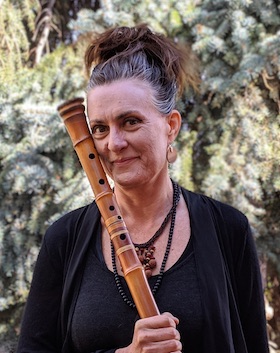
Anne NORMAN
DAVID HUGHES & GINA BARNES
David HUGHES, an expert in Japanese folk song (min’yō), taught music at SOAS (The School of Oriental and African Studies, University of London) from 1987 until his retirement in 2008. He is now a Research Associate of the Department of Music and the Japan Research Centre.
His contributions to Anglo-Japanese relations and understanding through traditional music research and performance activities earned him the Order of the Rising Sun from the Japanese Emperor in 2017 and the UK’s annual Japan Society Award in 2011. His scholarly activities in particular were recognised by the award of the Koizumi Fumio Ethnomusicology Prize in 2018.
David founded the SOAS Min’yo Group and the London Okinawa Sanshinkai, the major groups performing and teaching traditional Japanese folk music in the UK. He also founded the SOAS Noh Group, now part of the University of London Noh Society, which encourages the teaching of Noh performance. David has also been involved with events featuring over 200 visiting performers from Japan.
David has lived for over ten years in Japan, his main research area, but has also written about aspects of music in Java, Thailand and Korea, as well as about musical grammars and oral mnemonics. His major publications include the books Traditional Folk Song in Modern Japan (2008) and the co-edited Ashgate Research Companion to Japanese Music (2008).
Gina BARNES has been married to David since 1975 and has shared in his journey around the world of Japanese music. She is a leading figure in Japanese and East Asian archaeology, as reflected in her recent book Archaeology of East Asia: the rise of civilization in China, Korea and Japan and her founding of the Society for East Asian Archaeology. She taught for 24 years at Cambridge and Durham Universities and has produced over a hundred publications.
In 1981 Gina received her geimei, Tōsha Keihō, from her teacher of shinobue and nōkan flutes, Tōsha Suihō I (now Tōsha Meishō II). She enjoys singing and accompanying min’yō.
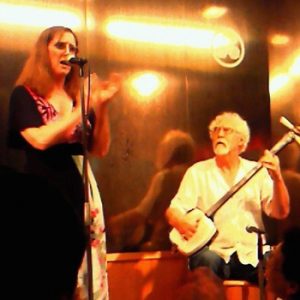
MICHAEL SOUMEI COXALL
Michael Soumei COXALL studied sankyoku and honkyoku shakuhachi in Japan for many years under the legendary Kinko Ryū, Chikumeisha master and Living Cultural Treasure, the late YAMAGUCHI Goro, and still continues his studies with MIZUNO Komei on frequent visits to Japan. He also studied shinkyoku under SUGAWARA Kuniyoshi in Tokyo.
He was awarded his shakuhachi ‘Master’s Licence’ in 2007 and the professional name ‘Soumei’. He taught full-time at SOAS, University of London from 1986 to 2009. He now just teaches Chikumeisha honkyoku, sankyoku ensemble and shinkyoku music in the UK.
Michael has performed widely in the UK and Europe as well as in Japan including at the National Theatre in Tokyo. He is also the founder member of both the ‘London Hogaku Ensemble’ and the ‘Hibiki Ensemble’ and is a member of the Chikumeisha-kai. He was also co-organiser of the ESS Summer Schools in London in 2006 and 2011, and in Barcelona in 2016.
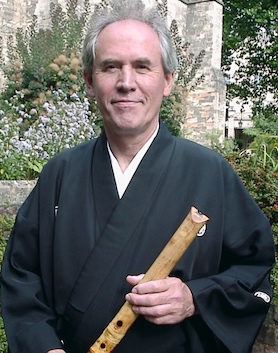
Michael Soumei COXALL
HORACIO CURTI
Horacio CURTI encountered the shakuhachi for the first time on the Himalayas and decided to go to Japan to study the instrument under KAKIZAKAI Kaoru sensei, focusing on koten honkyoku music. It was there that he received his shakuhachi shihan from YOKOYAMA Katsuya sensei on the year 2004, becoming the first shakuhachi master in Spain.
He works as a performer on Japanese, Western Classical Contemporary and free improvised music having collaborated with institutions such as Anthwerp Royal Conservatory, Brussels conservatory and Universities such as London, Graz, Barcelona, Autónoma de Barcelona, Ramon Llul, Oberta de Barcelona and groups such as Orchestre Philharmonique Royal de Liège and Plural Ensemble. He has premiered compositions by Ramon HUMET, David PADROS, Olivia CARRIÓN, NAKAMURA Saiko and Jim FRANKLIN; worked with musicians and dancers such as Esteban Algora ALGORA, Alessandra ROMBOLÁ, Jim FRANKLIN, KAKIZAKAI Kaoru, Veronique PIRON, Andres CORCHERO and Rolf MEESTERS.
CURTI has played and taught in South and North America, Europe and Japan and has commercially released two solo albums (‘Ichi’ and ‘Home is Now’), created and recorded the music for the CD accompanying the book ‘Cuentos Zen. Pequeñas historias para despertar’ (both in Spanish and Catalan), the music for the short movie ‘Mater Salvatoris’ and has worked both in theatre and with dance. In 2015 he was awarded the prize ‘Consul General del Japón en Barcelona’ and in 2017 he edited the book ‘Eolssigu! The sounds of Korea’. He has been appointed as soloist for the 2019 premiered of Ramon HUMET’s shakuhachi concert.
Resident in Barcelona, he has a degree in Ethnomusicology and teaches at the Escola Superior de Música de Catalunya (Esmuc) and SAE Institut Barcelona. He is currently working on his Phd in Ethnomusicology.
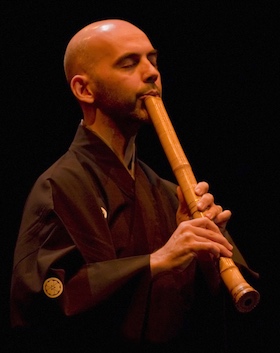
Horacio CURTI
KIKU DAY
Kiku DAY (PhD, London; MFA, Mills; BA, London) is an ethnomusicologist and shakuhachi player, working as an external lecturer at the Royal Academy of Music, Aarhus, Denmark, teaching ethnomusicology.
She grew up in Copenhagen, Denmark with her Japanese and American parents. She gave up her studies in classical Western flute to study Zensabō honkyoku repertoire with master OKUDA Atsuya in Tokyo for 11 years.
DAY has since her return to Europe dedicated her life to the potential use of jinashi shakuhachi today and has been occupied with the creation of a contemporary repertoire for jinashi shakuhachi. Several composers from different parts of the world have written for her, among others: TAKAHASHI Yuji, Roxanna PANUFNIK, Frank DENYER, Vytautas GERMANAVICIUS, Yumi HARA and Mogens CHRISTENSEN. She has performed with performers such as Fred FRITH, Joanna MACGREGOR, Mats GUSTAFSSON and Joëlle LÉANDRE, and as a soloist with Odense Symphony Orchestra playing TAKEMITSU Toru’s ‘November steps’ and PANUFNIK’s ‘Wild Ways’ with Nonsuch Choir.
Today, DAY continues her research and publish on regional shakuhachi traditions, the shakuhachi communities online and spirituality in shakuhachi playing. She lives at a meditation centre in Denmark and explores the connection between meditation and shakuhachi playing.
DAY is a founding member of the European Shakuhachi Society for which she now serves as chairperson and is the chair of the World Shakuhachi Festival 2018 Executive Committee.
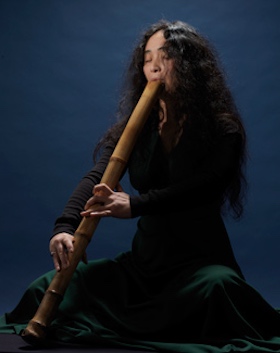
Kiku DAY
JIM FRANKLIN
Dr Jim FRANKLIN is a master performer of the shakuhachi. He initially studied composition, in Australia (with Peter SCULTHORPE), Germany (with Milko KELEMEN) and Holland (with Ton de LEEUW), and ethnomusicology in Australia (with Dr Allan MARETT). During his undergraduate studies he encountered the shakuhachi through recordings, and was fascinated by it. After a period of postgraduate studies in Europe, he had the opportunity to commence learning the instrument in Australia with Dr Riley LEE and later in Japan with FURUYA Teruo and YOKOYAMA Katsuya. In 1996 he received the title shihan (master) from YOKOYAMA sensei, and was thus officially licensed to teach and perform shakuhachi.
As a composer, FRANKLIN is currently active in the areas of contemporary and electroacoustic music, closing the circle to his earlier activities as composer. He now composes for shakuhachi solo and in combination with other instruments, and frequently performs projects with shakuhachi and live electronics, sometimes in combination with dance and video art. The interface between shakuhachi and electronics is a key area of interest.
A further focus of his current activities may be found in shakuhachi-duo performances with his wife, SUGINO Hiroko. In the area of solo shakuhachi, FRANKLIN has specialized in the honkyoku of the school of YOKOYAMA Katsuya (Kokusai Shakuhachi Kenshūkan) and in modern music. Since 2004 FRANKLIN has lived in Germany. From 2006 to 2009 he was founding Chairperson of the European Shakuhachi Society.
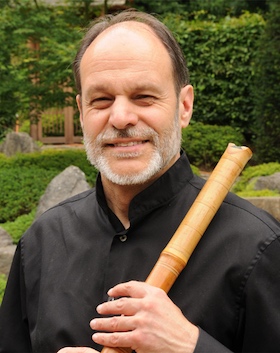
Jim FRANKLIN
JEAN-FRANÇOIS SUIZAN LAGROST
French-born flutist Suizan LAGROST is professor of art education at the Conservatories of Le Kremlin-Bicêtre and Asnières near Paris. As a versatile musician, he excels in both the Western and Japanese musics. After a traditional curriculum of concert flute in Mulhouse and Paris, then a DEA of Music of the 20th century at the University of Paris-Sorbonne, he began the shakuhachi in 2000 and obtained in 2014 the title of Dai-Shihan (grand master) from the Tozan school. He published in 2013 a Japanese chamber music CD entitled “Kyoku” with the koto player Mieko MIYAZAKI.
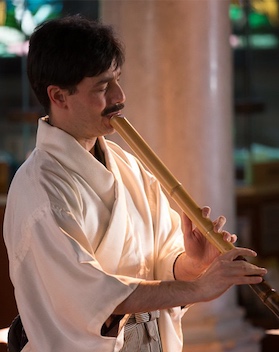
Jean-François Suizan LAGROST
CARLOS ZINGARO
Carlos Zíngaro is a Portuguese violinist and electronic musician active in free improvisation.
Zingaro studied classical music at the Lisbon Music Conservatory from 1953 to 1965, and during the years 1967/68 he studied pipe organ at the Sacred Music High School and did studies on musicology and electroacoustic music. Also, during the 1960s, he was a member of the Lisbon University Chamber Orchestra. In 1967 he formed the musical group PLEXUS. Zingaro has performed at many music festivals in Europe, Asia and America. He has more than 50 published records under his name or in collaboration with other musicians / composers.
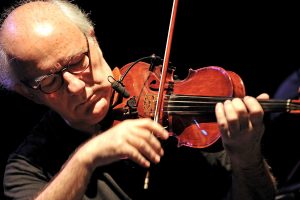
Carlos ZINGARO
MIYAZAKI MIEKO
MIYAZAKI Mieko was born in Tokyo. After being accepted into the Tokyo National University of Fine Arts and Music, her training finished with an invitation to perform as a soloist in the presence of the imperial couple in Japan. She graduated in 1992, and the following year she was awarded the highest distinction by the national radio NHK-FM (Japan Broadcasting Corporation).
Chosen by the Japan Foundation to represent Japan during international cultural events, she performed in various concerts in Asia, Europe and throughout the United States. In 2003, her work ‘The Current’ (CD Columbia Records-Japan for the duo ‘East Current’) for koto and shakuhachi, which was directed by FUJIWARA Dozan, is considered one of the thirty most beautiful compositions of all time by the Hogaku Journal specialists, The Kotoby. This recording brings her total to nine albums currently distributed in Japan as well as others in the United States.
On moving to France in 2005 as an unknown musician with an instrument equally unknown in Europe, she became recognised immediately and soon established herself worldwide as one of the leading figures in Japanese koto, pushing the limits and capacities of her music and the instrument in many different music genres as a soloist and in collaboration with numerous artists.
In 2014, she was invited to the Violin in the Sand Festival where she played her composition ‘Hachigatsu’ with an orchestra. In 2015, seeking greater exposure for the koto and Japanese music in general, she appeared on The Voice on the French TV network TF1 and the La boite a Musique show with Jean-François ZYGEL on France 2. The same year she also created the duo Dankin with jazz saxophonist Franck WOLF, recording on the WM Music label and performing at the 2015 Paris Jazz Festival.
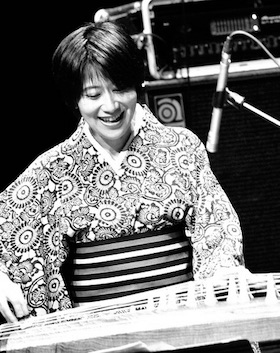
Mieko MIYAZAKI
TAKAHASHI GAHO
Gaho TAKAHASHI started learning the koto when she was 5 years old from her mother, Utaiko Takahashi. When she was 15 she started having lessons with professor Masateru Ando at the Tokyo University of Arts, where she received her bachelor’s degree in music, with a focus on koto and shamisen.
Since then, Gaho TAKAHASHI has performed extensively around the world, including in the Teatro Malibran in Italy, Wiener Konzerthaus in Austria, Federation Square in Melbourne … In Japan she performed at Sogakudo Hall, Kyusogakudo Hall, Kioihole, Marunouchi Building, Edo-Tokyo Museum, etc.
She won the National Hogaku High School Student competition in 2005. She also won the 3rd prize of the Folk Instruments Osaka International Music Competition in 2015.
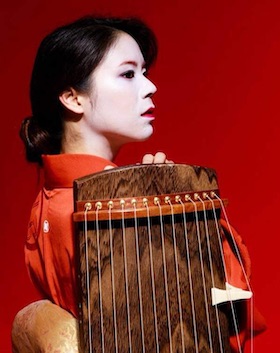
Gaho TAKAHASHI

